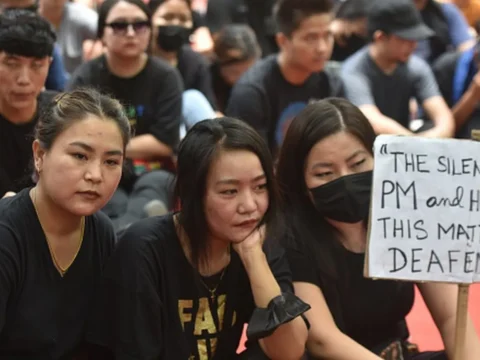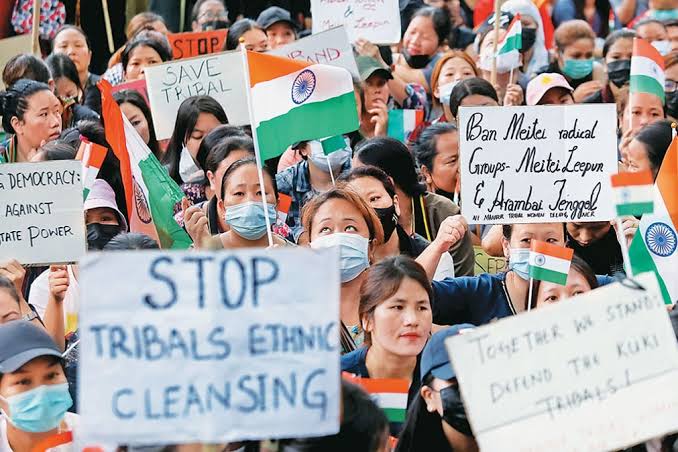Manipur, a state known for its rich ethnic diversity, has long been a site of turmoil, with ethnic tensions between the Meitei, Kuki, and Naga communities spiraling into violence, mistrust, and discontent. Despite several peace efforts and political negotiations over the years, the unrest continues, and the state remains embroiled in conflict. The time has come to face a hard truth: political separation might be the only viable solution to achieve lasting peace in Manipur.
Manipur’s political landscape is marked by a complex tapestry of communities, each with its own distinct identity, culture, and political aspirations. The Meitei community predominantly resides in the Imphal Valley, while the Kukis, Nagas, and other indigenous groups primarily inhabit the hills. This geographic division has led to a sense of separation between the communities, further aggravated by historical grievances, ethnic violence, and political marginalization. For decades, successive governments in Manipur have failed to address the aspirations of these communities, particularly the Kukis and Nagas. The Meitei-dominated government has been accused of favoring the interests of one community while neglecting others, thereby exacerbating tensions. The Kuki community, for example, has long been vocal about their desire for greater political autonomy and self-determination, as they feel marginalized within the existing political structure.
Over the years, numerous efforts have been made to integrate the different ethnic groups in Manipur through political dialogues, peace agreements, and reconciliation processes. The most notable of these was the “Suspension of Operations” (SoO) agreement, signed between the Indian government and several Kuki militant groups. While it provided a temporary ceasefire, it failed to address the root causes of the conflict. The state’s governance system, which is heavily dominated by the Meitei community, continues to marginalize the Kuki and Naga populations. The recent violence in Manipur has proven that these attempts at integration have largely been unsuccessful. Despite peace talks and agreements, tensions continue to rise, and the political framework in Manipur has shown little capacity to reconcile these divergent groups. The failure of the state’s leadership to create an inclusive system has further deepened the divide, leaving many questioning whether coexistence is even possible under the current political structure.
In light of these ongoing challenges, political separation appears to be the only practical solution to ensure peace and stability in the region. This does not necessarily mean secession, but rather the creation of autonomous political entities that can govern themselves according to the unique needs and aspirations of each community. Such a solution would allow the Kukis, Nagas, and Meiteis to have control over their own affairs, free from the domination of any single group. For the Kuki community, a separate administrative or political setup would allow them to address their concerns directly, such as issues of land rights, security, and cultural preservation. Similarly, the Naga community, which has long advocated for greater autonomy and self-rule, could benefit from the creation of a separate political framework where their interests are adequately represented. The Meitei community, while retaining control over the Imphal Valley, would be able to govern themselves without the constant pressure of negotiating with other ethnic groups.
Political separation, in this context, is not about creating further divisions or fueling hostilities. Rather, it is about giving each community the political space to govern and develop in a way that aligns with their own values and needs. With self-governance, the different communities can focus on developing their own resources, protecting their cultural heritage, and ensuring the security of their populations, all without interference from external forces. Moreover, political separation would allow for the development of policies that are more reflective of the distinct needs of each community, leading to better governance and more efficient delivery of public services. This would, in turn, foster a sense of ownership and responsibility among the people, which is critical for the long-term stability and development of the region.
If the status quo continues, the risk of further violence and escalation remains high. In the past, periods of violence have often led to displacement, loss of life, and a deepening of mistrust between communities. The state of Manipur, under its current administrative structure, has failed to prevent or adequately address these conflicts. Political separation offers a chance to de-escalate tensions by removing the competition for political control and resources between the ethnic groups. By providing each group with the autonomy to manage its own affairs, there would be a significant reduction in the factors that contribute to inter-ethnic violence. In the long term, this could lead to improved relations between the different communities, as they are no longer forced into a competitive or adversarial political environment.
The ongoing conflict in Manipur is a direct result of years of political neglect, marginalization, and the failure to recognize the unique identities and needs of its diverse communities. The dream of a unified Manipur, under a single political system, has proven elusive. It is clear that political separation, in the form of autonomous administrative regions for the Kuki, Naga, and Meitei communities, is the only way forward for achieving peace. This separation is not about division for its own sake, but about creating a framework where each community can live in harmony, free from the fear of domination or exploitation. It is about acknowledging that in a state as diverse as Manipur, the best path to peace is one that respects and upholds the self-determination of all its people.


